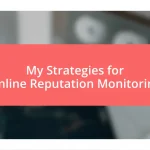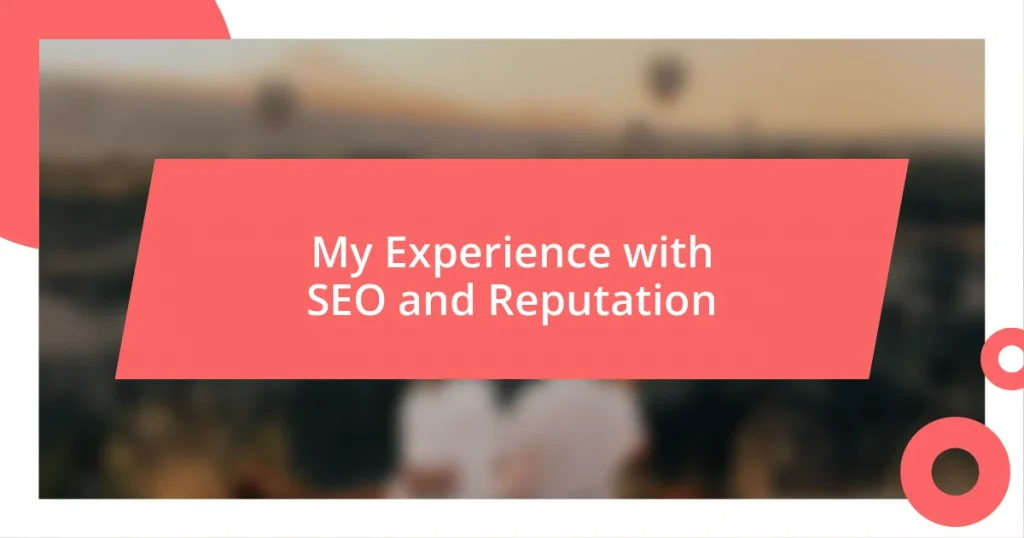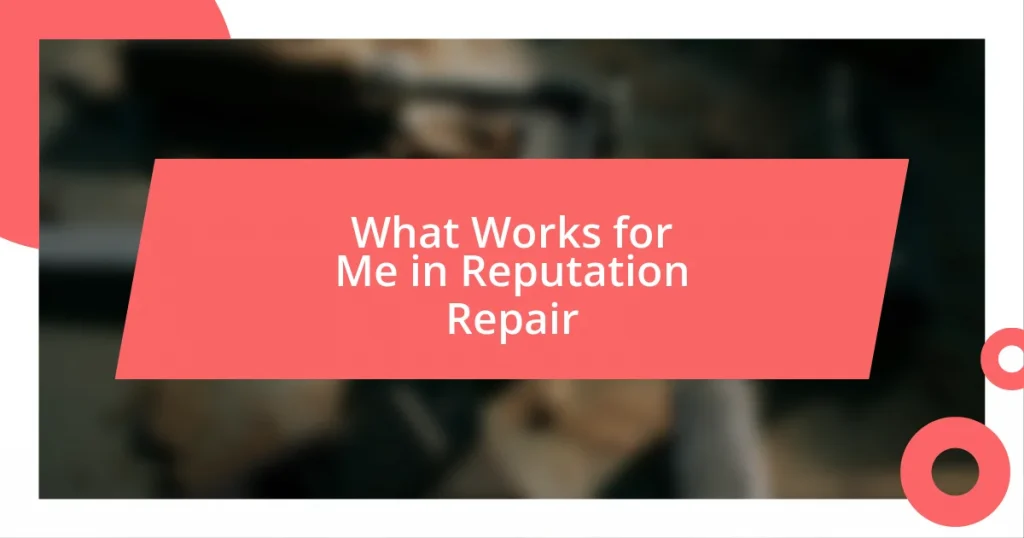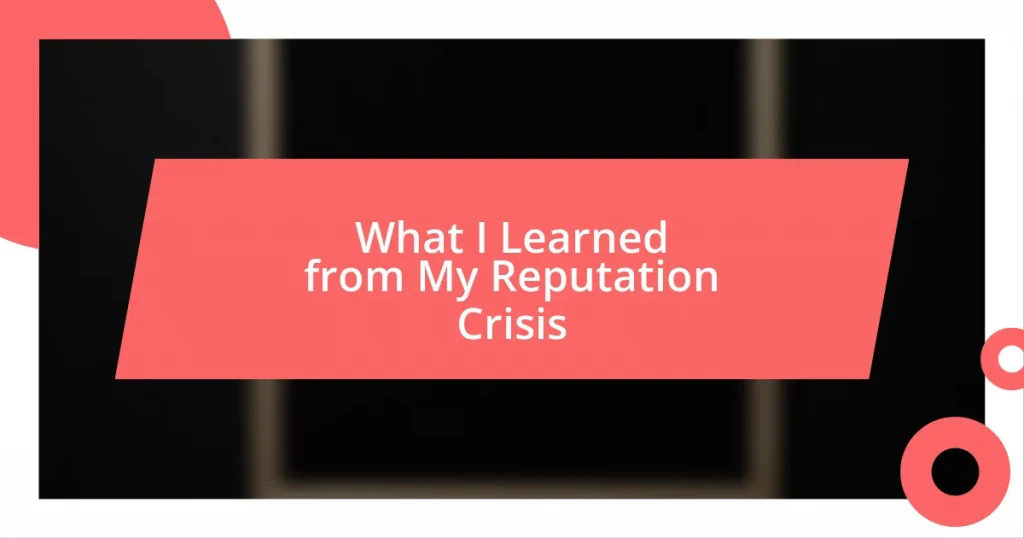Key takeaways:
- Effective keyword research and on-page optimization can significantly enhance website visibility and engagement.
- Maintaining a positive online reputation is crucial for building trust, influencing decisions, and seizing career opportunities.
- Proactively creating quality content and engaging with your audience can counteract negative feedback and improve overall reputation.
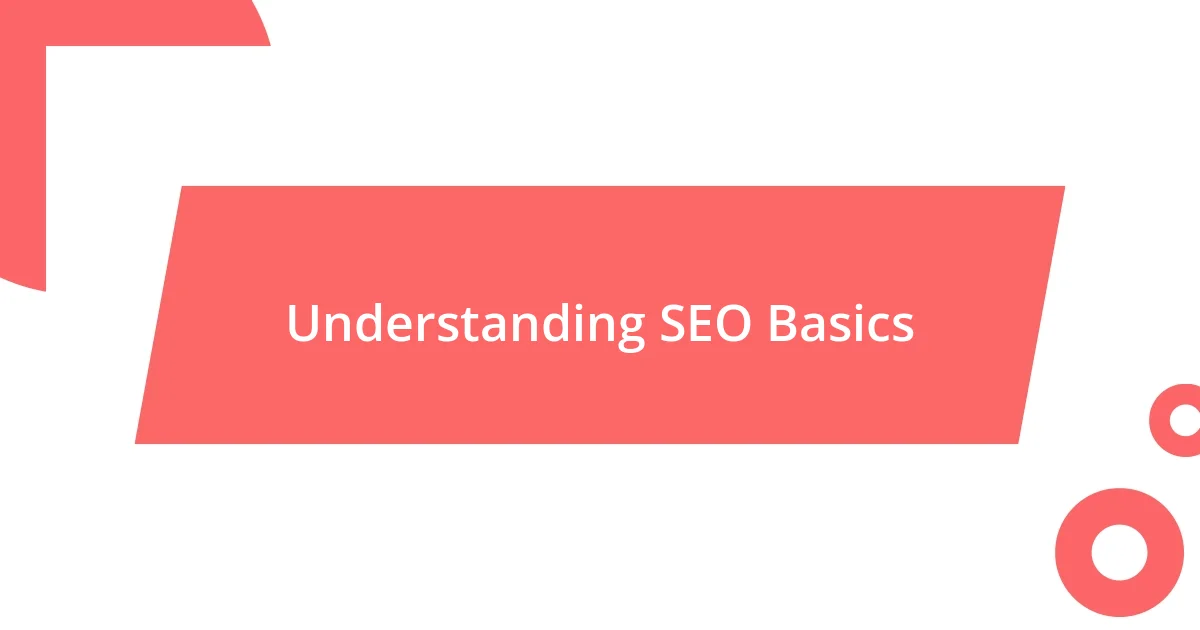
Understanding SEO Basics
At its core, SEO, or Search Engine Optimization, is about making your website more visible on search engines like Google. I remember when I first delved into SEO; I felt overwhelmed by all the technical jargon. But thinking about it simply—like a spotlight shining on my content—made it less intimidating and more exciting.
One of the fundamental concepts of SEO is keyword research. I often found myself brainstorming what words my audience would use to find my content. It’s fascinating how a single word can change everything! By incorporating those keywords thoughtfully into my articles, I noticed a significant boost in traffic and engagement, which was incredibly rewarding.
Another crucial aspect is on-page optimization, which involves tweaking elements on your website to improve its performance. I realized that small changes, like optimizing my meta descriptions or ensuring my images were tagged properly, made a big difference. Have you ever tried to adjust one tiny thing and then watched it snowball into greater visibility? Those moments are what keep me motivated to learn more about SEO.
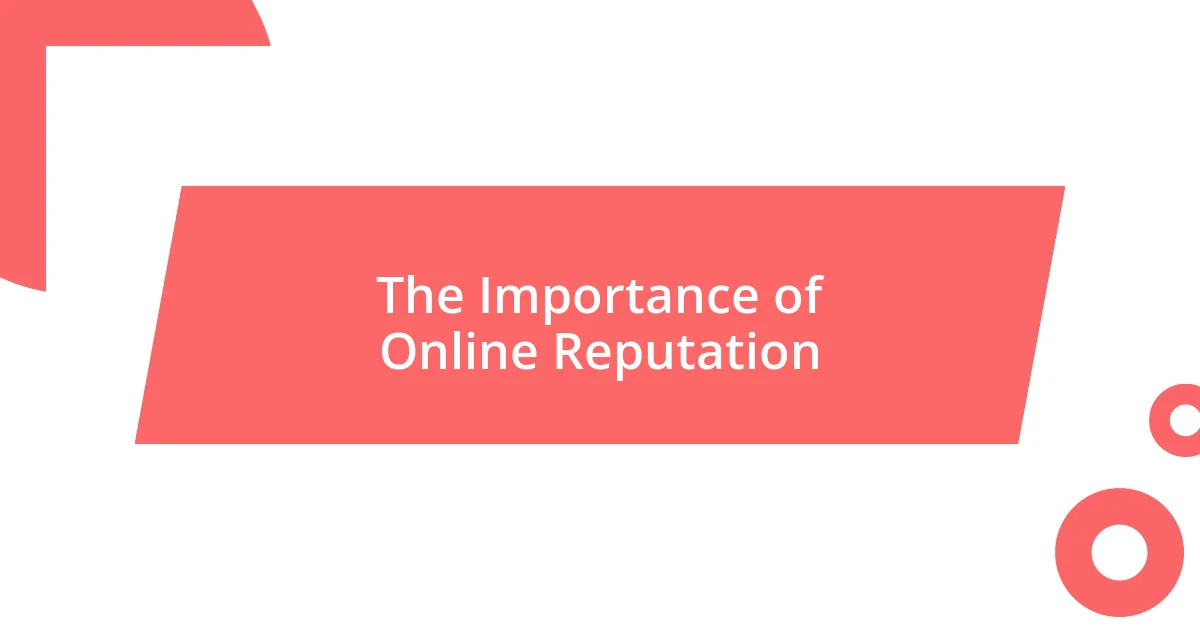
The Importance of Online Reputation
When I first learned about online reputation, I underestimated its impact. I remember a time when a negative review about my work popped up online. It felt like a punch in the gut. The way people perceived me shifted overnight, illustrating how fragile our reputations can be in the digital space. It made me realize that managing my online presence isn’t just about promoting my work but also about actively safeguarding my reputation.
The significance of online reputation cannot be overstated. It shapes how potential clients, employers, or customers view us. Here are a few key reasons why it’s so crucial:
- Trust Building: A solid online reputation fosters trust with your audience, which can lead to increased loyalty.
- Influence on Decisions: Many people research online before making decisions; a positive reputation can sway them in your favor.
- Crisis Management: Being aware of your online presence allows for quicker response to potential issues, protecting your brand from long-term damage.
- Competitive Edge: A strong reputation sets you apart from competitors and can be a decisive factor in choosing one service provider over another.
- Career Opportunities: For professionals, having a good online reputation can open doors to new projects and job offers.
Reflecting on my journey, I realized consistent engagement and being proactive has helped me reshape my narrative online, turning challenges into valuable learning experiences.
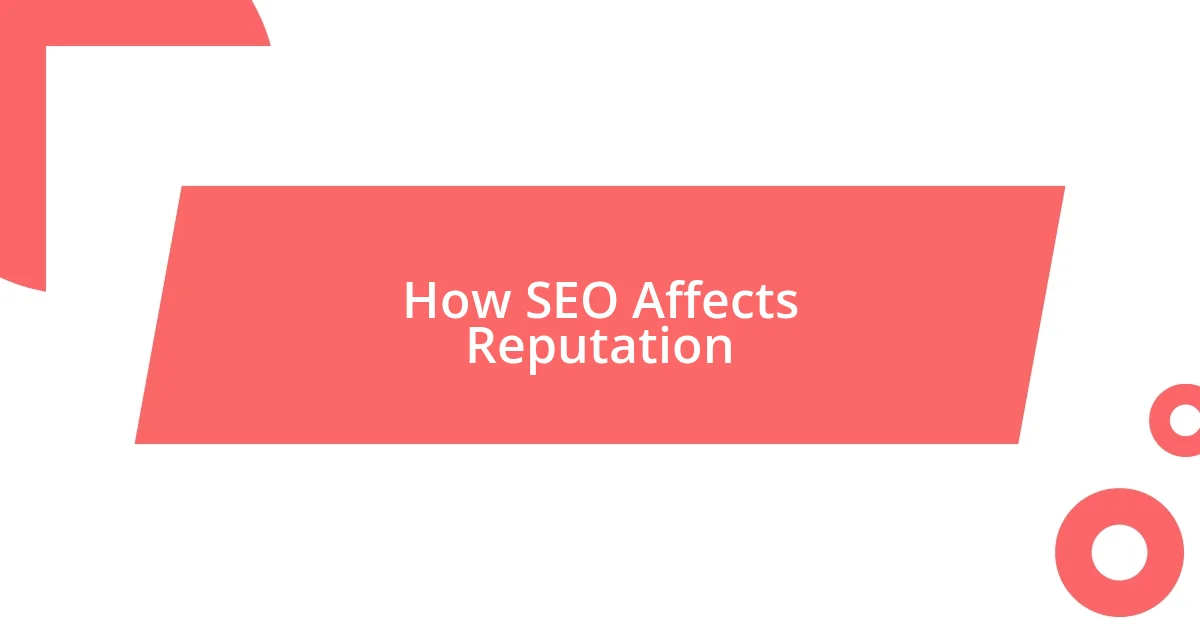
How SEO Affects Reputation
When I started optimizing my content for SEO, I quickly learned that search engine results heavily influence how others perceive my brand. One misstep, like a poorly written meta description or low-quality backlink, can distort my reputation overnight. I remember checking my Google ranking one week and feeling proud, but the following week, a drop in visibility shook my confidence. That experience highlighted just how interconnected SEO efforts are with the management of one’s online reputation.
The balance between SEO and reputation management can feel daunting. I often question, “Am I just chasing algorithms, or am I genuinely creating value for my audience?” It’s a delicate dance where meeting search engine criteria shouldn’t come at the cost of authenticity. For instance, I decided to write articles that directly addressed my audience’s pain points, which not only improved my search rankings but also fortified a trustworthy image. It was like creating a community, making every interaction meaningful.
Moreover, public perception is often shaped by what shows up on the first page of search results. I recall a colleague who had a fantastic reputation, yet a few negative articles from years ago still lingered online. Despite all their excellent work, potential clients were hesitant to engage due to those remnants. This taught me that a positive digital footprint is not just about current reputation but also about actively curating past content to mitigate any long-lasting effects.
| SEO Factor | Reputation Impact |
|---|---|
| Positive Content | Builds trust, enhances credibility |
| Negative Content | Erodes trust, can deter potential clients |
| Keyword Optimization | Increases visibility, shapes audience perception |
| Engagement Metrics | Reflects value provided, influences opinions |
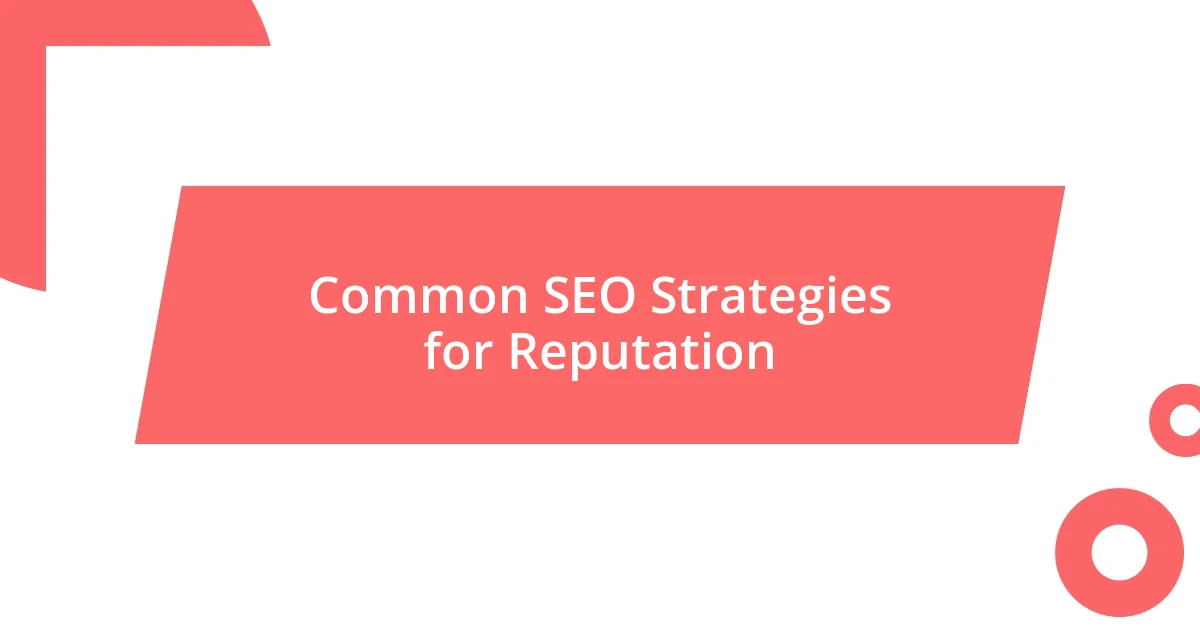
Common SEO Strategies for Reputation
It’s fascinating how the right keywords can shape not just visibility but also reputation. I remember diving into keyword research for a blog post that I thought had little value. To my surprise, the targeted keywords resonated with my audience, boosting traffic significantly. I felt a sense of accomplishment, realizing that simply understanding what people sought made my perspective more relevant. It reinforced the idea that careful keyword selection doesn’t just help in ranking better; it actively cultivates a connection with my readers, positively influencing their perception of me.
Another valuable strategy I embraced was producing positive content that counters any negative narratives. I once faced a questionable review that lingered online, making me feel vulnerable. Instead of dwelling on it, I began sharing success stories and client testimonials. The ripple effect of those positive narratives was palpable; not only did they enhance my credibility, but they also overshadowed the negative feedback. This taught me a crucial lesson: by proactively crafting my online persona, I have the power to shape how I’m viewed, transforming doubts into trust.
Additionally, I found that monitoring engagement metrics provided surprising insights into my audience’s perception. I vividly recall checking my social media analytics and noting a spike in shares for a particular article. This wasn’t just a number; it felt validating, a reminder that my words were making an impact. It raised a question in my mind: “What resonates most with my audience?” Understanding this not only fine-tuned my strategy but also reinforced my commitment to delivering genuine value. My experience showed me that reputation isn’t just about defense—it’s also about engagement, communication, and nurturing a positive image.

My Personal SEO Success Stories
When I think about my journey with SEO, one standout moment comes to mind. I had just launched a new service, and I poured my heart into a landing page optimized with carefully chosen keywords. After a couple of weeks, I noticed an influx of inquiries directly linked to that page. It was exhilarating; I felt like I was finally resonating with my audience. That experience taught me how powerful the right SEO strategies can be in driving genuine interest and trust.
Another success story revolves around a time I faced online criticism. A negative review had taken up residence on the first page of search results, and I was worried about how it might affect my reputation. Rather than letting it linger, I focused on creating rich, high-quality content highlighting my achievements and client satisfaction. It was like a refreshing cool breeze after a long, hot day. Eventually, those positive narratives drowned out the negativity, showing me that proactivity in managing your reputation can yield significant rewards.
I also remember a particularly insightful webinar I attended on SEO tactics. The speaker emphasized the importance of authentic storytelling, which really struck a chord with me. I began to weave personal anecdotes into my blog posts, illustrating my brand’s journey and values. Not only did my engagement rates soar, but I also felt more connected to my readers. It made me wonder: how often do we overlook the relationship between our genuine stories and our success in SEO? I realized then that cultivating a personal touch could turn ordinary content into something truly special.
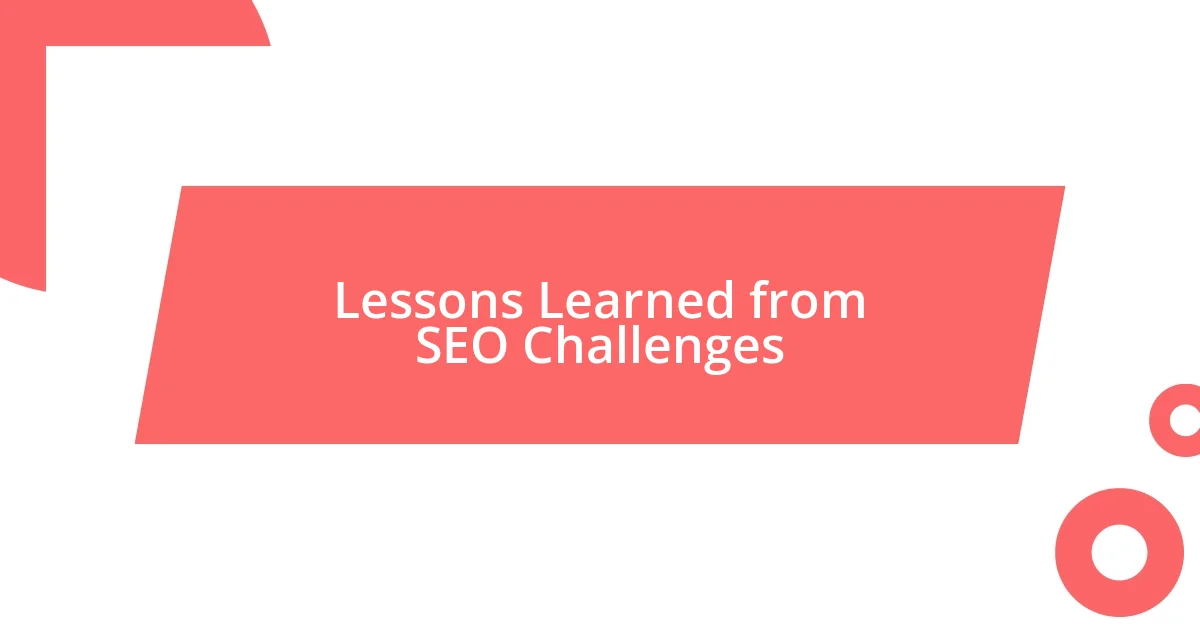
Lessons Learned from SEO Challenges
Facing SEO challenges has taught me some invaluable lessons that I carry with me. For instance, during a period of stagnating website traffic, I decided to completely overhaul my approach. I asked myself, “What if I focused more on user intent rather than just keywords?” This shift prompted me to create content that genuinely answered my audience’s questions, which not only improved my rankings but also connected me more deeply with my readers. It was a reminder that SEO isn’t just about algorithms; it’s about people.
One particular instance stands out in my memory. I had a blog post that initially flopped; it simply failed to attract any attention. After analyzing it, I realized that I hadn’t fully understood my audience’s needs. I went back, revised the piece, and added specific examples and relatable scenarios. I remember feeling a mix of frustration and determination, and when the revised version suddenly took off, I learned that adaptability is key. Isn’t it fascinating how a simple tweak can reveal new insights?
Moreover, dealing with sudden changes in search algorithms challenged me to remain flexible and proactive at all times. I recall when a major update rolled out unexpectedly, and I felt a slight panic. But I took a step back and reframed the challenge as an opportunity. It prompted me to delve into the reasons behind the algorithm changes and adjust my strategies accordingly. This experience solidified my belief: continuous learning and adaptation is essential in the ever-evolving landscape of SEO. Wouldn’t you agree that embracing change often leads to growth?







